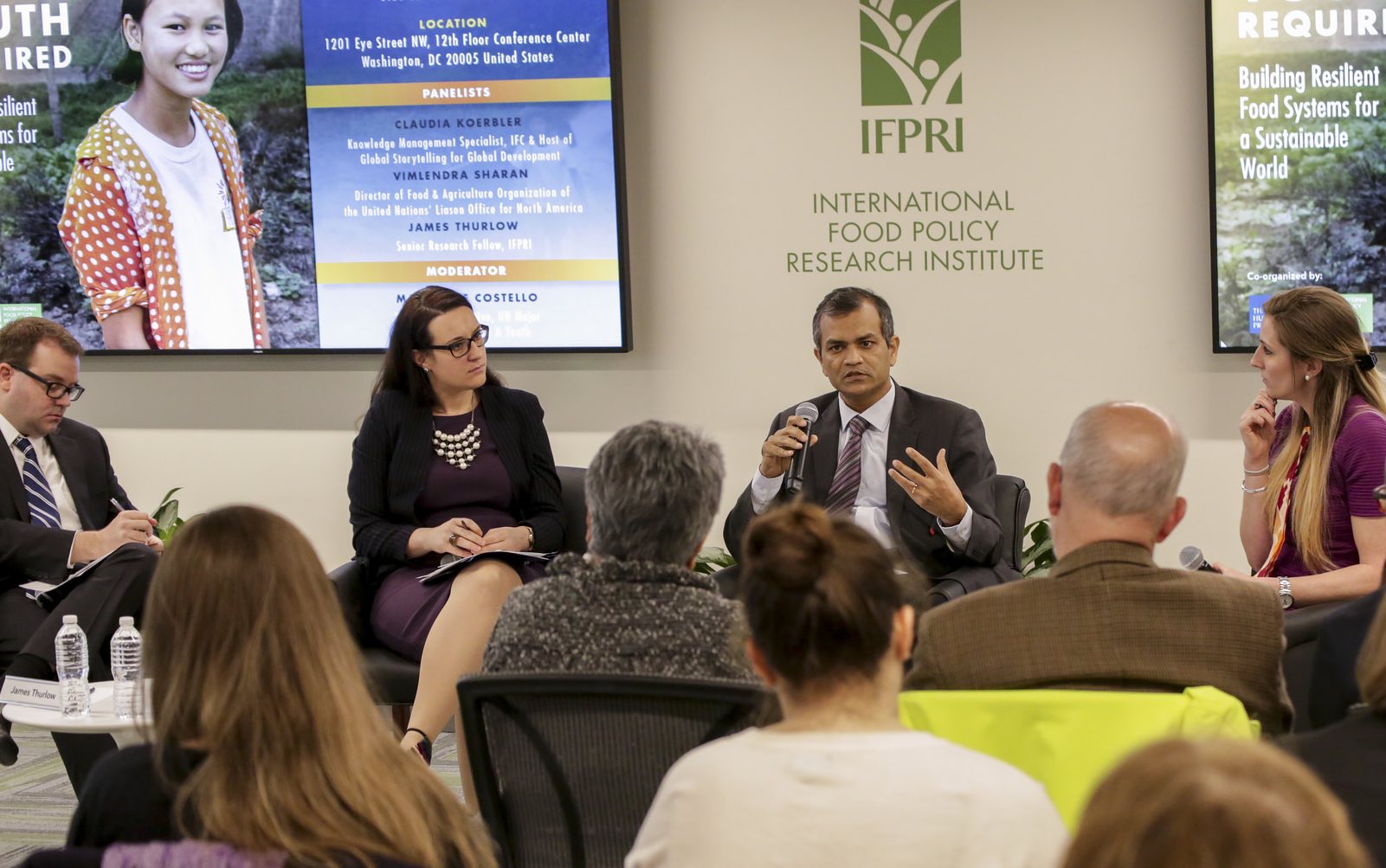The world’s population is expected to reach 9.5 billion by 2050 and a 60 percent increase in current food production levels will be needed to feed everyone. Meanwhile, the average age of farmers throughout Africa and Asia is currently 60. So who will grow the food and build the resilient food systems necessary to sustain a growing population?
In a recent panel titled Youth Required: Building Resilient Food Systems for a Sustainable World, development experts from the International Finance Corporation (IFC) and the UN Food and Agricultural Organization (FAO) joined IFPRI Senior Research Fellow James Thurlow to discuss the complex challenges in creating more youth employment opportunities in agriculture, and to make food systems better able to contend with climate change and other threats.
“Mass education has brought the status of agriculture down … I’ve yet to meet a farmer who is educating his son to come back to farming,” said Vimlendra Sharan, director of FAO’s Liaison Office for North America. Youth hear “agriculture” and think “hopelessness,” Sharan said, adding that there is one acceptable form of “arranged marriage” in the working world: Youth and agriculture. But, he concluded, it is preferable that this be a “love marriage” in which talented, educated, and trained young people view it as a desirable, remunerative career.
“Millennials are absolutely disengaged when it comes to what Sustainable Development Goals are, and what global development solutions look like,” said IFC Knowledge Management Specialist Claudia Koerbler, host of Global Storytelling for Global Development. With over 3 billion people able to access the internet, continued Koerbler, social media platforms create innumerable opportunities for “social capacity development” to take place. Citing an example of a Kenya-based mango farmer using social media to share his story and an India-based mango farmer responding with his own best practices, she concluded that these online tools can be active agents of change for engaging youth.
It was only appropriate that a youth farmer join the panel via video. Alpha Sennon, founder and executive director of WhyFarm, stressed that sensitization to farming as a fulfilling occupation must start during childhood. Through what Sennon called “agri-tainment,”—including a superhero character named “AGRIMan”—children are learning that producing abundant and nutritious food is heroic. For youth, Alpha said it is all about framing: Call it “swagriculture” and youth will take pride in getting involved.
Even if societies begin promoting and valuing farming as a vital occupation, it is currently not lucrative and barely able to achieve self-reliance for smallholders, Thurlow noted. But there is time to act with today’s large cohort of youth: “We have half a century to get Africa ready for retirement!” he exclaimed. Big foreign companies’ rising interest in Africa presents tremendous opportunities to for youth participation, he said. Governments and organizations must create policy environments that help in expanding youth opportunities, in coordination with rapidly evolving technological advancements and their uptakes by industry.
According to the panel, countries are in dire need of either overhauling or implementing existing policies that will make farming more profitable: Social protection; access to credit, insurance and land; regulated prices; and trade systems. Expanding market chains and opportunities in agriculture requires private sector investment and incentivizing policies. Sharan added that development professionals must do away with the fear of working with the private sector and instead strategize about how to develop effective partnerships.
We need to build out linkages between agriculture and other sectors, make children aware of food systems, and make agricultural technologies more affordable for smallholder farmers, panelists concluded, with Thurlow summing it up simply as, “we need less panic and more action.”
Mary Kate Costello is a Senior Policy Analyst and UN Representative for the Hunger Project; Katarlah Taylor is an IFPRI Senior Events Specialist.







